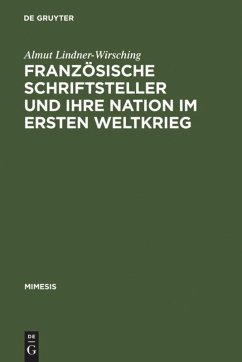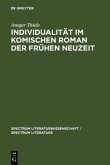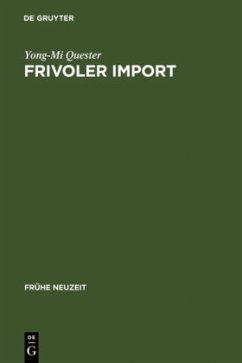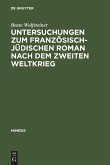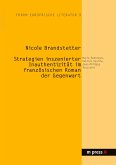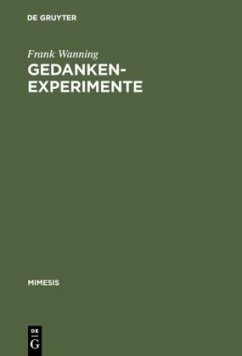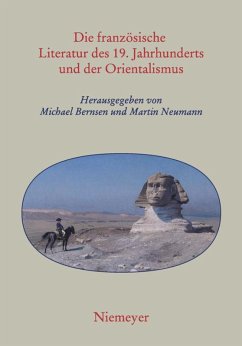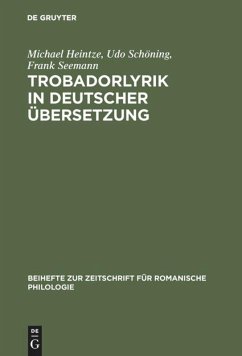This study examines the construction of national identity in the First World War as exemplified by representative French war novels. Central to the textual interpretation is the question of the connection between identity and (self-)demarcation. It transpires that the function of the image of the enemy as a constitutive factor in identity formation needs to be relativized. With reference to the hitherto neglected reception of war literature, it is possible to explain the special status accorded by the French public to writers active at the war front, who are compared here for the first time with civilian writers.
Der Erste Weltkrieg gilt noch heute als Höhepunkt des französischen Nationalgefühls und Musterbeispiel intellektueller Selbstmobilmachung. Die Arbeit untersucht die Konstruktion nationaler Identität am Beispiel von dreiundzwanzig repräsentativen Kriegsromanen, die noch während des Konflikts entstanden.
Ein erster, textinterpretatorischer Teil fragt nach dem Zusammenhang zwischen Identität und Abgrenzung auf der Inhaltsebene der Werke. Dabei zeigt sich, daß die Bedeutung des Feindbildes für die Konstruktion nationaler Identität wie auch für die Legitimation des Krieges relativiert werden muß. Entscheidender als die Definition des Gegners wurde mit zunehmender Kriegsdauer die Frage, wofür man kämpfte. Geschichtliche und kulturelle Traditionen, Werte und Symbole sowie der bei Schriftstellern aller politischen Couleur zu beobachtende Rekurs auf religiöse Bilder bildeten selbst während dieser extremen Form nationalstaatlicher Auseinandersetzung wichtige Elemente nationalerIdentität.
Der zweite Teil der Arbeit setzt sich mit der bisher noch nicht systematisch untersuchten Rezeption der Kriegsliteratur auseinander. Hier geht es um den Beitrag der Kriegsromane und ihrer Verfasser zur nationalen Selbstdefinition. Es wird versucht, den besonderen Stellenwert der Frontdichter in der französischen Öffentlichkeit zu erklären, die in dieser Studie erstmals vergleichend den zivilen Schriftstellern gegenübergestellt werden.
Der Erste Weltkrieg gilt noch heute als Höhepunkt des französischen Nationalgefühls und Musterbeispiel intellektueller Selbstmobilmachung. Die Arbeit untersucht die Konstruktion nationaler Identität am Beispiel von dreiundzwanzig repräsentativen Kriegsromanen, die noch während des Konflikts entstanden.
Ein erster, textinterpretatorischer Teil fragt nach dem Zusammenhang zwischen Identität und Abgrenzung auf der Inhaltsebene der Werke. Dabei zeigt sich, daß die Bedeutung des Feindbildes für die Konstruktion nationaler Identität wie auch für die Legitimation des Krieges relativiert werden muß. Entscheidender als die Definition des Gegners wurde mit zunehmender Kriegsdauer die Frage, wofür man kämpfte. Geschichtliche und kulturelle Traditionen, Werte und Symbole sowie der bei Schriftstellern aller politischen Couleur zu beobachtende Rekurs auf religiöse Bilder bildeten selbst während dieser extremen Form nationalstaatlicher Auseinandersetzung wichtige Elemente nationalerIdentität.
Der zweite Teil der Arbeit setzt sich mit der bisher noch nicht systematisch untersuchten Rezeption der Kriegsliteratur auseinander. Hier geht es um den Beitrag der Kriegsromane und ihrer Verfasser zur nationalen Selbstdefinition. Es wird versucht, den besonderen Stellenwert der Frontdichter in der französischen Öffentlichkeit zu erklären, die in dieser Studie erstmals vergleichend den zivilen Schriftstellern gegenübergestellt werden.

